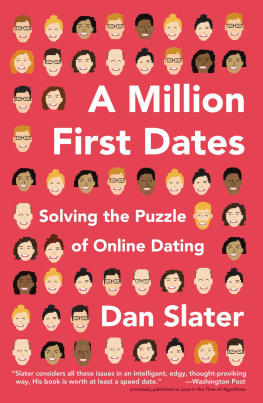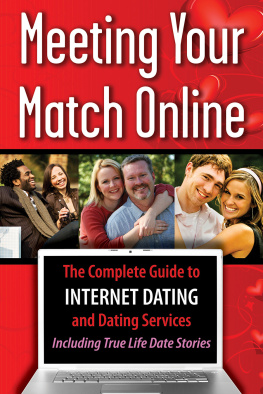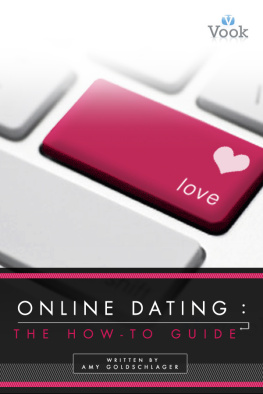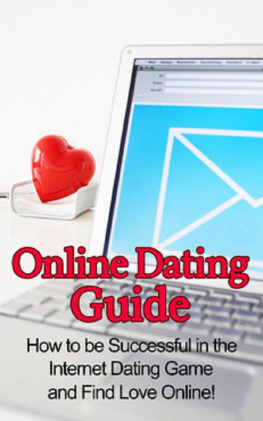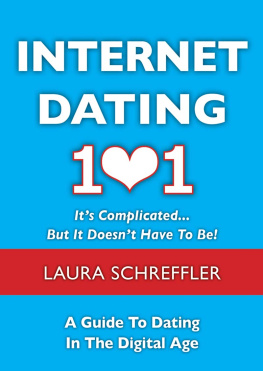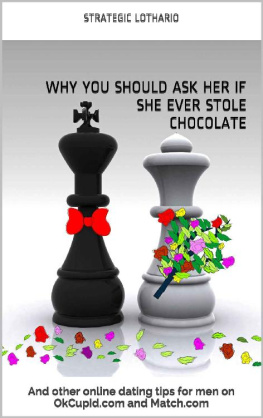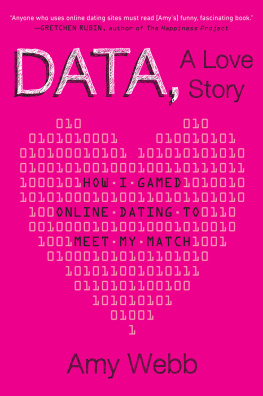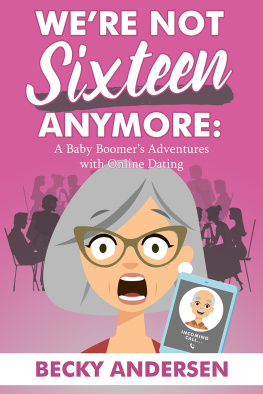CURRENT
A MILLION FIRST DATES
Dan Slater contributes to The New York Times and Fast Company magazine. He is a former legal affairs reporter for The Wall Street Journal, and his work has also appeared in The Washington Post, The Boston Globe, GQ, and Mens Health. Slater is a graduate of Colgate University and Brooklyn Law School. His favorite date remains dinner and a movie.
CURRENT
Published by the Penguin Group
Penguin Group (USA) LLC
375 Hudson Street
New York, New York 10014

USA | Canada | UK | Ireland | Australia | New Zealand | India | South Africa | China
penguin.com
A Penguin Random House Company
First published in the United States of America under the title Love in the Time of Algorithms by Current, a member of Penguin Group (USA) Inc., 2013
This paperback edition with a new preface published 2014
Copyright 2013, 2014 by Dan Slater
Penguin supports copyright. Copyright fuels creativity, encourages diverse voices, promotes free speech, and creates a vibrant culture. Thank you for buying an authorized edition of this book and for complying with copyright laws by not reproducing, scanning, or distributing any part of it in any form without permission. You are supporting writers and allowing Penguin to continue to publish books for every reader.
Portions of this book first appeared in GQ magazine.
Authors Note
This book attempts to be a factual inside account of the development of an industry, and a chronicle of how that industry has affected the lives of the people whose stories Ive told. The casual nature of online interaction, however, required taking liberties with some of the secondary material quotednamely, the conversations, profiles, and messages pulled from online dating sites and the Phantasy Tour forum. Occasionally, I relocated or transposed a sentence or paragraph, adjoined remarks written by the same person at different times, removed words or phrases from quotes without inserting marks of ellipsis, and cleaned up spelling and grammar. None of these changes are intended to alter meaning or make the material more interesting, but rather to privilege clarity and narrative flow over fidelity to the precise original. Also, the names of most online-dating users have been changed to protect their privacy.
THE LIBRARY OF CONGRESS HAS CATALOGED THE HARDCOVER EDITION AS FOLLOWS:
Slater, Dan.
Love in the time of algorithms : what technology does to meeting and mating / Dan Slater.
p. cm.
Includes bibliographical references and index.
ISBN 978-1-59184-531-7 (hc.)
ISBN 978-1-61723-009-7 (pbk.)
ISBN 978-0-698-15957-0 (ebk.)
1. Online dating. 2. Courtship. 3. Dating (Social customs)Technological innovations. 4. Marriage brokerageTechnological innovations. I. Title.
HQ801.82.S58 2013
306.730285dc23 2012036921
Designed by Daniel Lagin
While the author has made every effort to provide accurate telephone numbers, Internet addresses, and other contact information at the time of publication, neither the publisher nor the author assumes any responsibility for errors, or for changes that occur after publication. Further, the publisher does not have any control over and does not assume any responsibility for author or third-party Web sites or their content..
Version_1
For G & G
The Internet did not develop in order to facilitate relationships, any more than newspapers were invented to publish personal ads. Like the pandas thumb, evolution, whether natural or technological, takes unexpected directions.
Monica Whitty and Adrian Carr, Cyberspace Romance
CONTENTS
PREFACE TO THE PAPERBACK EDITION

STRAPPING IN
I met my wife in the most modern of ways: a yoga class. After a week or three of hemming and hawing, I collected my courage and asked her out. I was thirty-one, licking the wounds of a recently failed relationship, and about to be laid off from my job. Who wouldnt want to date me?
Yesbelieve it or notshe declined this incredible opportunity. She had a boyfriend. Rats.
So I began dating people, some of whom I met online, and started working on this book. Time passed. Then, one sunny day, my wife-to-be popped up in that right-hand column on Facebook as A Person You May Know. As it turned out, the boyfriend had since been banishedmuch to my delight!and eighteen months later we were married.
Hardly any of that was predictable or formulaic, particularly when you add those other relationships that came before. Were those other relationshipswith all their joy and scarringnecessary for this one to work out?
When this book was published, the most common question I got was: Why a book about online dating? Id explain that the book was really about modern relationships and how theyre affected by all this technology were using to find new relationships and keep old ones going. Okay, fine. But why? And the answer I never gave, maybe because it seemed so unsophisticated, but would like to give now is this: I wrote a book about relationships because I never understood books about relationships.
Not novels. I love a good romance. Im talking about all those how-to books, the ones with lots of peppy lists and cheery chapter titles. They tell you what youre doing wrong, how to improve your appeal, and are general enough to apply to pretty much anyone. A lot of the advice makes sense. For instance, brush your teeth before a date. Thats helpful. But once you get past the common-sense stuff, these books usefulness sort of ends. Why is that?
My opinion is that relationship manuals fail because they start from the premise that finding a good relationship is reducible to a formula of dos and dontsone that worked for the author or for the authors friends and is guaranteed to work for you, too, if only you can learn to do it right.
The reality of dating, of course, is far from formulaic. Its more like riding a rollercoaster, blindfolded, while the track ahead is still under construction. The original plans for the track were abandoned, and now the engineers are working with whatever materials they can get, hoping to finish the next loop-the-loop before you fly off into orbit. Your stomach drops when youre plunged into a horrifying encounter one day and you scream to be let off. But wait. That memory is quickly erased when the dating rollercoaster rockets you up to a moment of hopefulness the next day, a peak of joy that was so unforeseeable but makes perfect sense! Except... maybe it doesnt make sense. Because another plunge awaits, the worst kind of sinking feeling: that no call back (or text back) after the date that seemed to go so well. You swear youll never ride that fucking rollercoaster again. But you will.
I think the rise of online dating heightens the impression that finding love is a formula, that love is literally a matter of filling out lists and doing a bunch of mechanical things on your laptop or phone. Youll know youve mastered the formula when your dating site spits out the perfect mate.
The dating rollercoaster is moving fast these days, along with the other aspects of life that have been accelerated by the Internet. A new mate is always, potentially, a click away. But its not all sunny days. This unprecedented efficiency in the dating market solves some old problems and raises many new ones. If its become easier to move on from relationships, should you? If you can use the Internet to meet people in foreign countries, should you? If dating sites promise to find you the perfect mate (if only you follow their formula!), should you believe them? If you can monitor a new boyfriend 24/7 on Facebook and Twitter and Instagram and Match.com, should you? How can you make this new efficiency work in your favor?

